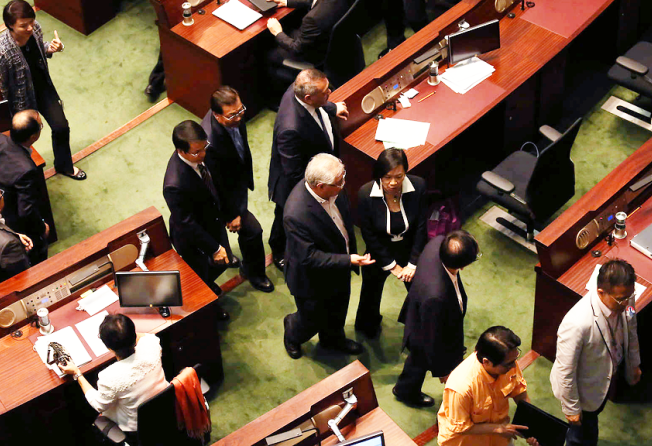Hong Kong lawmakers explain botched walkout that left reform plan with just 8 votes of support

The lawmaker who initiated a botched walkout by pro-establishment legislators that left them unable to take part in a vote they had hailed as “historic” has apologised for “miscommunication” as allies and foes slammed his “unwise” manoeuvre.
Speaking after the government’s reform package collapsed in the Legislative Council today – receiving just eight votes, with 28 against – lawmaker Jeffrey Lam Kin-fung took the blame for encouraging his pro-establishment colleagues to depart moments before the vote. The Business and Professionals Alliance member said he had been attempting to delay the vote so his party colleague, veteran rural kingpin Lau Wong-fat, could get to the chamber.
The plan backfired; the meeting remained quorate as more than half of the lawmakers remained in the chamber, and Legco president Jasper Tsang Yok-sing went ahead with the vote.
“Uncle Fat has been ill but he has always wanted to come back and vote,” Lam said. “We wanted to let him fulfil his wish so we asked for a 15-minute suspension. But due to a communication gap, some of us didn’t join the walkout. I apologise for this.”
Lau, 79, has long been a dominant figure in the New Territories, but has recently begun to wind down his activities, handing over the chairmanship of powerful rural affairs body the Heung Yee Kuk to his son.
Lau later told the South China Morning Post he had been in Kowloon Tong this morning and got stuck in traffic on the way to the Legco building in Admiralty. He said he had told Lam in recent days that he was keen to cast his vote, and had been receiving updates from his colleagues this morning.
Asked whether he had ever considered telling his colleagues to vote without him, Lau responded with a resounding "no". Asked whether he feared a reprimand from Beijing, he said: "I’ve tried my best and I have no regrets".
Speaking in Legco earlier, Lau said: “I have tried to rush back. I feel bad in my heart. I’m sorry."
While lawmakers had long been expected to deny the government’s plan for the 2017 chief executive poll the two-thirds majority it needed, no one could have foreseen the plan receiving just a handful of votes.
The final twist in the reform tale began when Legco’s warning bell sounded, alerting lawmakers that they had five minutes to get to the chamber and vote. After four minutes, Lam rose to request a suspension “for further discussion”, a plea Tsang refused.
With less than 30 seconds left, Lam and fellow Beijing loyalist Ip Kwok-him stood up, with Ip waving to his colleagues. Most followed, leaving just a few members of the camp in their seats.
Tsang, who like the government officials present seemed to be caught by surprise, established that the quorum was met and proceeded to the vote after prompting by several pan-democrats.
The proposal would have fallen anyway, as 27 pan-democrats and one pro-establishment lawmaker carried out their pledge to vote no.
Of the eight who stayed to vote yes, five were members of the business-friendly Liberal Party.
Party chairman Felix Chung Kwok-pan said: “I didn’t know what they were doing. Nor was I given advance notice of the walkout plan.”
“Even if I had known they were waiting for Uncle Fat, I would have stayed all the same,” Chung added. “This is the moment of Hong Kong and people are expecting the result in ten seconds. How can we leave it like that? It’s a little unwise to walk out because Uncle Fat’s vote wouldn’t affect the result at all.”
A Liberal Party source later confirmed that Beijing's liaison office had been in touch with party leader Vincent Fang Kang within half an hour of the vote to praise its lawmakers for their contribution.
Federation of Trade Unions veteran Chan Yuen-han and independents Lam Tai-fai and Chan Kin-por also stuck around to vote yes.
Tam Yiu-chung, former chairman of the Democratic Alliance for the Betterment and Progress of Hong Kong, was among those who missed the vote. He agreed the walkout was “reckless”.
New People’s Party chairwoman Regina Ip Lau Suk-yee admitted the pro-establishment camp had made a “blunder”.
“I am very sad and it was very regrettable,” Ip said. "I know the package cannot be passed but I still wanted to vote in favour of it with my own hands. … It was unfortunate.”
Asked whether she owed Beijing’s liaison office an answer for the debacle, she said: “I didn’t think about that. I just want to apologise to my voters.”
While the pro-establishment camp licked its wounds, pan-democrats were quick to point to the fact the official record would show that Legco had thoroughly rejected the reform plan, rather than merely failing to give it a big enough majority.
“As a matter of Legco procedure, absence is treated the same as an opposing vote. This is a historic record of today’s voting,” said Civic Party lawmaker Alan Leong Kah-kit, who convenes the weekly lunch meeting of 23 pan-democrats.
Democratic Party chairwoman Emily Lau Wai-hing said the “ridiculous” walkout reflected the pro-establishment camp’s limited understanding of Legco rules.
“We are not kids playing games here in Legco … many of them even said this would be the most important vote of their life,” she said. “I guess not only the local government would be very mad about this but also Beijing.”
The absence of Beijing loyalists when a package they had loudly supported was being put to a vote would send a confusing signal to Hongkongers, she added.
Independent pan-democrat Wong Yuk-man said his rivals had made a “shameful” move and turned the reform plan into “one with the least votes in support in history”.
Additional reporting by Stuart Lau